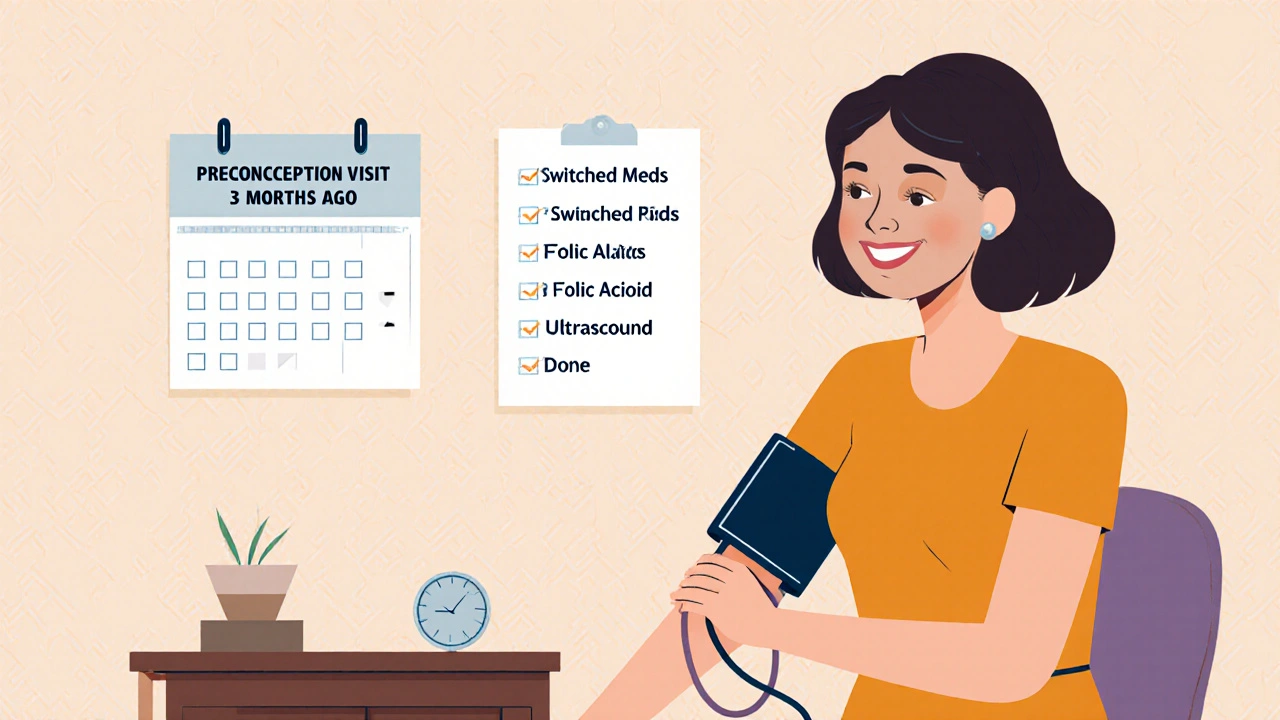When a woman develops high blood pressure during pregnancy, the goal is simple: protect both her health and the baby’s. But not all blood pressure medications are safe. One drug that’s commonly used outside of pregnancy-lisinopril-isn’t just discouraged during pregnancy, it’s dangerous. If you’re pregnant or planning to be, and you’ve been taking lisinopril, you need to know why switching is urgent and what options actually work.
Why Lisinopril Is Risky in Pregnancy
Lisinopril belongs to a class of drugs called ACE inhibitors. These drugs lower blood pressure by relaxing blood vessels. They work great for non-pregnant adults-especially those with heart failure, diabetes, or chronic kidney disease. But in pregnancy, they don’t just lose their benefit. They become a threat.
Studies dating back to the 1980s, including data from the FDA and the American College of Obstetricians and Gynecologists (ACOG), show that ACE inhibitors like lisinopril can cause serious harm to a developing fetus. The risks aren’t theoretical. They’re documented in real cases.
Exposure to lisinopril during the second and third trimesters has been linked to:
- Low amniotic fluid (oligohydramnios)
- Fetal kidney failure
- Lung underdevelopment
- Skull deformities
- Stillbirth or neonatal death
Even a single dose in late pregnancy can trigger these effects. There’s no safe threshold. That’s why guidelines from every major medical body agree: lisinopril must be stopped before conception or as soon as pregnancy is confirmed.
What Happens If You’re Already Taking It?
If you’re on lisinopril and just found out you’re pregnant, don’t panic-but don’t wait either. Stopping abruptly can cause your blood pressure to spike, which is also dangerous. The key is to act fast and under medical supervision.
Your doctor will likely switch you to a safer medication within days. Common alternatives include:
- Methyldopa (the oldest and most studied option)
- Labetalol (a beta-blocker widely used in pregnancy)
- Nifedipine (a calcium channel blocker, especially for sudden spikes)
These drugs have been used for decades in pregnant women with no evidence of fetal harm. They’re not perfect-some may cause dizziness or fatigue-but they’re proven to be far safer than lisinopril.
Don’t try to switch on your own. Even over-the-counter supplements like magnesium or garlic extract aren’t reliable replacements. Blood pressure control during pregnancy needs precision. Your care team will monitor your levels closely and adjust doses as your body changes.
Why Not Just Lower Blood Pressure Any Way You Can?
Some people think, “If I eat less salt, exercise more, and sleep better, maybe I won’t need meds at all.” That’s true for mild cases. But pregnancy-induced hypertension isn’t always lifestyle-related. It can be caused by changes in placental blood flow, hormonal shifts, or underlying conditions like chronic kidney disease.
Uncontrolled high blood pressure during pregnancy raises your risk of:
- Preeclampsia (a life-threatening condition involving high blood pressure and organ damage)
- Placental abruption (where the placenta separates from the uterus)
- Preterm birth
- Low birth weight
- Emergency C-section
Medication isn’t a crutch-it’s a tool to prevent these outcomes. Skipping it because you’re afraid of drugs can be more dangerous than taking the right ones.

What About Before Pregnancy?
If you’re planning to get pregnant and currently take lisinopril, talk to your doctor now. Don’t wait until you miss a period. Many women don’t realize they’re pregnant until week 5 or 6. By then, the baby’s kidneys and blood vessels are already forming-and that’s when ACE inhibitors cause the most damage.
Doctors recommend switching to a pregnancy-safe alternative at least 3 months before trying to conceive. This gives your body time to stabilize and ensures your blood pressure stays controlled during the critical early weeks.
It’s also a good time to review your full medication list. Other drugs to avoid include angiotensin receptor blockers (ARBs) like losartan and valsartan. Even some NSAIDs like ibuprofen can be risky in later pregnancy. Your pharmacist can help flag these.
Real Stories, Real Risks
In 2023, a study published in the Journal of Maternal-Fetal & Neonatal Medicine followed 142 pregnant women who were exposed to ACE inhibitors during pregnancy. Of those exposed in the second or third trimester, 38% had babies with serious complications. One baby was born with no urine output due to kidney failure. Another had multiple skeletal deformities. These weren’t rare outliers-they were direct results of medication exposure.
Compare that to women who switched to methyldopa early: less than 5% had complications, and most went on to deliver healthy babies.
There’s no “maybe” here. The data is clear. If you’re pregnant or planning to be, lisinopril is not an option.
What Should You Do Next?
If you’re currently taking lisinopril and pregnant:
- Call your OB-GYN or midwife immediately. Don’t wait for your next appointment.
- Do not stop the medication on your own. Abrupt withdrawal can cause rebound hypertension.
- Ask for a referral to a maternal-fetal medicine specialist if you haven’t already seen one.
- Request a baseline ultrasound to check amniotic fluid levels and fetal kidney development.
- Start tracking your blood pressure at home twice daily and log the numbers.
If you’re planning pregnancy:
- Schedule a preconception visit with your doctor or pharmacist.
- Ask for a full medication review-especially for blood pressure, diabetes, or autoimmune drugs.
- Get your blood pressure under control with pregnancy-safe options before conceiving.
- Start taking prenatal vitamins with folic acid (at least 400 mcg daily) to reduce neural tube risks.

Alternatives to Lisinopril: What’s Safe?
Here’s a quick comparison of approved blood pressure medications during pregnancy:
| Medication | Class | Typical Dose | Common Side Effects | Used in First Trimester? |
|---|---|---|---|---|
| Methyldopa | Alpha-2 agonist | 250-1,000 mg, 2-3 times daily | Drowsiness, dry mouth, dizziness | Yes |
| Labetalol | Beta-blocker | 100-400 mg, 2-3 times daily | Fatigue, low heart rate, nausea | Yes |
| Nifedipine | Calcium channel blocker | 10-30 mg, extended-release, once daily | Headache, swelling in legs, flushing | Yes |
| Hydralazine | Vasodilator | 10-50 mg, 3-4 times daily | Headache, rapid heartbeat, lupus-like symptoms | Yes |
Lisinopril isn’t listed here for a reason: it’s not safe at any stage. Even if your doctor says it’s “fine for now,” get a second opinion. This isn’t a gray area. The science is settled.
What About Breastfeeding?
Once the baby is born, lisinopril can be restarted safely during breastfeeding. Only tiny amounts pass into breast milk, and studies show no harm to nursing infants. But you’ll still need to monitor your blood pressure closely, as it can fluctuate after delivery.
Always tell your pediatrician if you’re taking any medications while breastfeeding. They’ll watch for signs of low blood pressure or unusual drowsiness in the baby.
Final Thoughts
Managing blood pressure during pregnancy isn’t about avoiding all meds-it’s about choosing the right ones. Lisinopril saves lives in non-pregnant adults. But in pregnancy, it can end them. The difference isn’t about dosage or timing. It’s about biology. The developing baby’s organs are uniquely sensitive to ACE inhibitors.
If you’re reading this because you’re worried, you’re already doing the right thing. The next step is action: talk to your provider, get your meds switched, and keep moving forward. You’re not alone. Thousands of women have been in your shoes-and with the right care, they had healthy babies. You can too.
Can lisinopril cause birth defects even if I only took it for a few days?
Yes. Even short-term exposure during the second or third trimester can lead to serious fetal complications, including kidney failure and low amniotic fluid. There is no known safe window for lisinopril use in pregnancy. If you took it at any point after conception, tell your doctor immediately-even if it was just once.
Is there a safe alternative to lisinopril if I have kidney disease and am pregnant?
Methyldopa and labetalol are the preferred options for women with chronic kidney disease during pregnancy. While they don’t protect the kidneys the way ACE inhibitors do, they control blood pressure without harming the fetus. Your nephrologist and OB-GYN should work together to monitor your kidney function and adjust treatment as needed.
Can I take lisinopril if I’m trying to get pregnant but haven’t confirmed yet?
No. Many women don’t know they’re pregnant until after the first 4-6 weeks-exactly when ACE inhibitors cause the most harm. If you’re trying to conceive, switch to a pregnancy-safe medication at least 3 months before stopping birth control. Don’t wait for a positive test.
What if my doctor says lisinopril is fine because my blood pressure is low?
This is a dangerous misconception. Blood pressure doesn’t determine safety-it’s the drug’s effect on fetal development. Even if your numbers are normal, lisinopril can still restrict blood flow to the placenta and damage fetal organs. No reputable guideline supports its use in pregnancy, regardless of symptoms.
Are natural remedies like magnesium or hibiscus tea safe replacements for lisinopril?
No. While some natural approaches may help slightly lower blood pressure, none can reliably prevent complications like preeclampsia or placental abruption. Relying on tea, supplements, or diet alone during pregnancy is risky. Medications like methyldopa and labetalol are proven, monitored, and safe. Don’t trade evidence for anecdote.


Write a comment